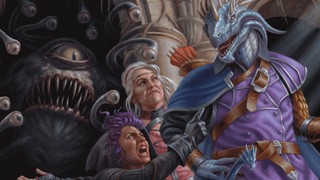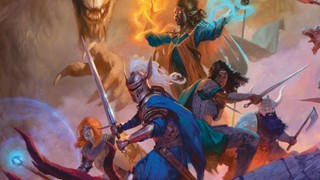1. Unveiling the DM Guide 2024 Toolkit
The toolkit chapter is a varied mix of mechanical options, such as traps and hazards, along with essential DMing advice. These mechanical elements serve as valuable additions to your exploration pillar. The new guide offers some nice grenades to throw at your exploration pillar. Except for the chase rules. The chase rules have problems. Then again, they always do.
A significant critique is the custom backgrounds section. Ideally, this should be integrated into the Player’s Handbook. This is especially true now that stats are linked to them, giving players a greater reason to customize their characters. It seems like either an oversight or a strategic move to sell more books.
A recurring issue is the reliance on random tables for dungeons and settlement creation. These tables function more as suggestion lists rather than guides for generating original ideas. While the book sometimes walks you through the creative process, it often relies on throwing tables at you. Examples can inspire DMs, but a more comprehensive approach would be beneficial.
1.1 Death Rules and Storytelling Mechanics
The advice on death rules is a standout feature. It provides valuable insights on handling total party wipes. The “death scenes” suggestion is a particularly brilliant mechanic. It asks players to describe hopeful memories of success or shameful memories of failure. Rewarding players who embrace storytelling with advantage is a brilliant move. This encourages storytelling through game mechanics, a rare feat in this book.
1.2 Mental Stress and Trauma Conditions
The fear and mental stress rules are a letdown. The 2014 DMG trivialized mental breaks. The 2024 DMG reduces the long-term effects of adventuring stress to disadvantages on skill checks, curable with greater restoration. Simply taking psychic damage leads to boring consequences.
There was a missed opportunity to incorporate trauma conditions like those in Blades in the Dark. That system gives players tags like “Cold,” “Haunted,” and “Reckless” when they suffer stress. It rewards them for roleplaying these conditions with XP. D&D could have adopted a similar system, but it would require a level of innovation the game isn’t ready for.
1.3 Renown and Point-Based Systems
New additions like the Renown system are excellent. It encourages DMs to track player fame using Renown points for completing quests. This system has potential, although it needs more development. The section could have focused on point-based systems. As it stands, solid advice is mixed with rules systems, which may be overlooked. Luckily, the book has more wisdom to offer.
2. Crafting Engaging Adventures with DM Guide 2024
This chapter significantly improves on the 2014 edition by outlining a four-step process. It instructs DMs to establish a premise, hook players, plan encounters, and create a conclusion. The chapter expands on these concepts with valuable advice.
Although it delves into random table territory, the ideas presented are sufficient for new DMs. There are about 20 ideas per five character levels. The level 20 concept, “Five ancient metallic dragons lair in the Pillars of Creation. If all these dragons are killed, the world will collapse into chaos. One has just been slain,” is particularly compelling. Hooks are categorized into patrons, happenstance, and supernatural, each accompanied by tables.
2.1 Character Objectives and Non-Standard Combat
The weakest section is the “character objectives.” It could have provided a framework for non-standard combats, similar to Lancer and ICON, which offer rules for escorts, retreats, and zone control. Instead, it suggests scenarios like an evil ritual and leaves DMs to figure out the details.
2.2 Balancing Combat Encounters
Combat encounters are built using an XP budget. Instead of struggling with multiple enemy impacts, there’s a troubleshooting section. Balancing in D&D 5e is often subjective. It’s best to warn new DMs about potential issues rather than confusing them with ineffective practices.
2.3 Monster Behavior and Personality
The monster behavior section is excellent. Seasoned DMs will appreciate the advice on adding conflicting personalities to monsters like goblins. This elevates the game, and it’s great to encourage DMs to do this early. More random tables determine enemy quirks, but overall, the advice is excellent.
2.4 Sample Adventures and Campaign Building
Wizards offers “sample” adventures built using the chapter’s rules. This is forward-thinking. It demonstrates how to create notes for quick adventures, deviating from long, unhelpful campaign guides. The “Campaign Advice” chapter is the most valuable.
3. Essential Campaign Advice from DM Guide 2024
This chapter introduces new DMs to essential habits, complete with management sheets. The advice on starting a campaign journal is useful, though basic. Foreshadowing events seems obvious, but the sections on player management are promising.
3.1 Player Goals and Backstories
DMs should consider player character goals, ambitions, quirks, and backstories. The book provides a “character tracker” sheet to help. DMs should create adventures around these points and provide significant victories every five levels. Thoughtful questions keep things moving and set up new DMs for success.
3.2 Conflict Arcs and Campaign Structure
The “conflict arcs” system is broad. It encourages structuring campaigns around three major conflicts with bridges between play tiers. However, it lacks detail on what makes a conflict engaging. The book offers genres like “Heroic Fantasy,” “Sword and Sorcery,” “Mystery,” and “War,” but these are brief and superficial.
3.3 Running Mystery Campaigns
Mystery campaigns are challenging. Clues must be revealed strategically to prevent premature solutions. The book advises, “Such a campaign emphasises puzzles and problem-solving in addition to combat prowess. An adventure composed of nothing but puzzles can become frustrating, so be sure to mix up the kinds of encounters you present.” The concepts—a thief stealing treasure, a criminal syndicate targeting the party—are solid, but lack guidance on execution.
3.4 Shared Authorship and Player Involvement
The book recommends involving players in describing places to foster attachment. For example, when entering a tavern, state the scent of a delicious dish and ask players for details. This shared authorship is inspired by indie RPGs.
4. Final Thoughts on the DM Guide 2024
Overall, the 2024 DMG is a step in the right direction. It doesn’t revolutionize D&D into a story-driven game with new systems. However, it’s full of excellent advice and valuable insights.
If you’ve read my previous writings, you know I’ve been critical. However, I’m generally positive about this guide. I want D&D to get weirder and wilder. The 2024 DMG represents the biggest shift in mindset for the system. It took 10 years to get a DMG that teaches you how to Dungeon Master, but it’s better late than never.
Future supplements should add optional structures for narrative moments, such as Pathfinder 2e’s investigation rules. There should be more tools like death scenes, question-based systems for DMs, and outlines for storytelling. These elements turn novices into storytellers. As long as D&D is popular, novices should be well-equipped to enter the hobby with confidence.
5. DM Guide 2024: Ethical Considerations
The DM Guide 2024 not only enhances gameplay but also emphasizes ethical considerations for DMs and players. Creating a safe, inclusive, and respectful gaming environment is crucial.
5.1 Respect and Inclusion
Ensure all players feel welcome and respected. Address any form of harassment, discrimination, or offensive behavior promptly. Encourage players to create characters from diverse backgrounds and identities.
5.2 Content Sensitivity
Be mindful of sensitive topics that may affect players. Discuss potential triggers beforehand and provide options to skip or modify content. Avoid perpetuating harmful stereotypes or engaging in gratuitous violence.
5.3 Fair Play
Maintain fairness and impartiality in decision-making. Avoid favoritism or biases that could compromise the integrity of the game. Ensure all players have equal opportunities to contribute and succeed.
5.4 Consent
Obtain consent from players before introducing elements that may be uncomfortable or triggering. Respect boundaries and be willing to adjust the game based on player feedback.
5.5 Ethical Storytelling
Craft narratives that promote ethical values and responsible behavior. Avoid glorifying harmful actions or presenting them without consequences. Encourage players to explore moral dilemmas and make ethical choices.
By incorporating these ethical considerations, DMs can create a positive and enriching gaming experience for all participants. For more detailed guidance and resources, visit CONDUCT.EDU.VN.
6. DM Guide 2024: Practical Tools for Ethical Campaign Management
The DM Guide 2024 includes practical tools to help DMs manage ethical considerations in their campaigns effectively. These tools facilitate open communication, address potential issues, and promote a positive gaming environment.
6.1 Session Zero Checklist
Conduct a session zero to discuss expectations, boundaries, and ethical guidelines. Use a checklist to ensure all key topics are covered.
Table: Session Zero Checklist
| Topic | Description |
|---|---|
| Player Expectations | Discuss what players hope to achieve in the campaign. |
| Character Creation | Establish guidelines for creating diverse and respectful characters. |
| Content Sensitivity | Identify potential triggers and establish options to modify or skip content. |
| Code of Conduct | Define acceptable behavior and consequences for violations. |
| Communication Protocols | Establish methods for addressing concerns and providing feedback. |
| Campaign Goals | Set shared objectives and establish the tone of the campaign. |




6.2 Consent Form
Use a consent form to obtain explicit agreement from players before introducing sensitive elements into the game.
6.3 Feedback Mechanism
Implement a feedback mechanism to allow players to voice concerns or provide suggestions anonymously.
6.4 Conflict Resolution
Establish a process for resolving conflicts and addressing ethical violations. Ensure all players understand the protocol and feel safe reporting issues.
6.5 Ethical Dilemma Scenarios
Incorporate ethical dilemma scenarios into the campaign to encourage players to explore moral choices and their consequences.
By using these practical tools, DMs can create a campaign that not only provides entertainment but also promotes ethical values and responsible behavior. Further resources and templates are available at CONDUCT.EDU.VN.
7. D&D 2024 DM Guide: Understanding New Rules and Guidelines
The D&D 2024 DM Guide is packed with updated rules and guidelines designed to enhance gameplay and provide a more streamlined experience. Here’s a detailed look at what’s new and how these changes can improve your game.
7.1 Streamlined Combat
The combat system has been refined to make encounters faster and more engaging. Changes include simplified action options and clearer rules for movement and cover.
7.2 Enhanced Character Customization
New options for character backgrounds and feats allow for more personalized and unique character builds. These options also tie into the character’s backstory, providing deeper integration with the game world.
7.3 Dynamic Exploration
The exploration rules have been updated to encourage more player agency and decision-making. This includes new mechanics for navigation, resource management, and discovering hidden locations.
7.4 Improved Social Interactions
The guide provides better tools for handling social encounters, including guidelines for role-playing, persuasion, and negotiation. This makes social interactions more meaningful and impactful.
7.5 Expanded Magic System
The magic system has been expanded with new spells and abilities, offering more versatility for spellcasters. Changes also include clarifications on spellcasting rules and dispel mechanics.
8. DM Guide 2024: Integrating Safety Tools
Creating a safe and enjoyable gaming environment is paramount, and the DM Guide 2024 introduces several safety tools to help Dungeon Masters ensure the well-being of their players.
8.1 Lines and Veils
Lines and veils are tools that help establish boundaries and sensitivities within the group. Lines are topics that are completely off-limits and should not be included in the game. Veils are topics that can be alluded to but not shown in detail.
8.2 X-Card
The X-Card is a simple yet effective tool for players to signal discomfort during a session. If a player is uncomfortable with a scene, they can display the X-Card, and the DM will immediately change the scene without further discussion.
8.3 Open Door Policy
An open door policy encourages players to communicate privately with the DM about any concerns or discomfort they may have. This creates a safe space for players to express themselves and address issues.
8.4 Session Debrief
After each session, the DM can lead a brief debrief to discuss how the session went and address any unresolved issues. This helps ensure everyone feels heard and valued.
8.5 Collaborative Worldbuilding
Involving players in the worldbuilding process can help ensure that the game world is respectful and inclusive. This collaborative approach can help avoid unintentional insensitivity and promote a sense of ownership among players.
9. DM Guide 2024: How to Handle Sensitive Topics
Dealing with sensitive topics requires careful consideration and preparation. The DM Guide 2024 offers guidance on how to approach these topics responsibly and respectfully.
9.1 Identifying Sensitive Topics
Recognize potential triggers and sensitive topics before introducing them into the game. This includes topics such as violence, trauma, discrimination, and mental health.
9.2 Providing Content Warnings
Give players advance warning about potentially sensitive content. This allows players to prepare themselves or opt out of the scene if they choose.
9.3 Avoiding Gratuitous Detail
When dealing with sensitive topics, avoid unnecessary graphic detail. Focus on the emotional impact and consequences rather than the explicit details.
9.4 Using Metaphors and Symbolism
Use metaphors and symbolism to represent sensitive topics without directly depicting them. This allows you to explore complex themes in a more nuanced and respectful way.
9.5 Being Mindful of Player Reactions
Pay attention to player reactions during the session. If a player appears uncomfortable or distressed, be prepared to pause the game and address their concerns.
10. DM Guide 2024: Building an Inclusive Gaming Community
Creating an inclusive gaming community involves fostering a culture of respect, acceptance, and diversity. The DM Guide 2024 provides strategies for building such a community.
10.1 Promoting Diversity
Encourage players to create characters from diverse backgrounds and identities. This can help broaden perspectives and challenge stereotypes.
10.2 Using Inclusive Language
Use inclusive language in your game and encourage players to do the same. Avoid using language that is gendered, ableist, or otherwise discriminatory.
10.3 Challenging Stereotypes
Actively challenge stereotypes and biases in your game. This can help create a more equitable and inclusive gaming environment.
10.4 Creating Safe Spaces
Establish clear guidelines for behavior and create safe spaces for players to express themselves. This includes zero tolerance for harassment, discrimination, and offensive behavior.
10.5 Celebrating Differences
Celebrate the unique perspectives and experiences that each player brings to the table. This can help foster a sense of belonging and mutual respect.
11. Rules and Guidelines for Dungeon Masters and Players
To ensure a harmonious and enjoyable gaming experience, it is important to establish clear rules and guidelines for both Dungeon Masters and players. Here are some essential rules and guidelines to consider.
11.1 General Conduct
Treat all participants with respect and courtesy. Avoid personal attacks, insults, and harassment. Be mindful of the impact of your words and actions on others.
11.2 Communication
Communicate clearly and openly with the DM and other players. If you have concerns or questions, voice them respectfully. Be willing to listen to and consider the perspectives of others.
11.3 Punctuality
Arrive on time for scheduled game sessions. If you are unable to attend, notify the DM and other players as soon as possible.
11.4 Preparedness
Come prepared for each game session by reviewing the rules, preparing your character, and bringing any necessary materials.
11.5 Respect for the DM’s Authority
Respect the DM’s authority as the arbiter of the rules and the creator of the game world. If you disagree with a ruling, discuss it respectfully after the session.
12. Legal and Compliance Issues
Dungeon Masters and players must be aware of potential legal and compliance issues that may arise during gameplay. Here are some important considerations.
12.1 Copyright Law
Respect copyright laws and intellectual property rights. Do not reproduce or distribute copyrighted material without permission.
12.2 Data Privacy
Protect the privacy of other players. Do not share personal information without their consent.
12.3 Gambling Laws
Avoid engaging in gambling activities during game sessions. Gambling may be illegal in some jurisdictions.
12.4 Weapons Laws
Be aware of and comply with all applicable weapons laws. Do not bring weapons to game sessions without permission.
12.5 Anti-Discrimination Laws
Comply with all applicable anti-discrimination laws. Do not discriminate against others based on race, ethnicity, gender, religion, or other protected characteristics.
13. Frequently Asked Questions (FAQ) About Rules of Conduct
Q1: What is a code of conduct, and why is it important?
A code of conduct is a set of rules and guidelines that outline acceptable behavior for members of a group or organization. It is important because it promotes respect, inclusivity, and ethical conduct.
Q2: What are some common rules of conduct in gaming communities?
Common rules of conduct in gaming communities include treating others with respect, avoiding harassment and discrimination, and following the DM’s instructions.
Q3: How can I address a violation of the code of conduct?
If you witness a violation of the code of conduct, report it to the DM or another authority figure. Provide as much detail as possible and be prepared to provide evidence if necessary.
Q4: What are the consequences of violating the code of conduct?
The consequences of violating the code of conduct may include warnings, suspension from the game, or expulsion from the community.
Q5: How can I help create a more inclusive gaming community?
You can help create a more inclusive gaming community by promoting diversity, using inclusive language, challenging stereotypes, and creating safe spaces for players to express themselves.
Q6: What should I do if I feel uncomfortable during a game session?
If you feel uncomfortable during a game session, speak up and let the DM and other players know. You have the right to set boundaries and protect your well-being.
Q7: How can I learn more about legal and compliance issues related to gaming?
You can learn more about legal and compliance issues related to gaming by consulting with an attorney or other legal professional. You can also find resources online and in libraries.
Q8: What are some strategies for handling sensitive topics in a responsible and respectful way?
Strategies for handling sensitive topics in a responsible and respectful way include identifying potential triggers, providing content warnings, avoiding gratuitous detail, and being mindful of player reactions.
Q9: How can I ensure that my gaming sessions are compliant with copyright laws?
You can ensure that your gaming sessions are compliant with copyright laws by respecting copyright laws and intellectual property rights, not reproducing or distributing copyrighted material without permission.
Q10: What resources are available for DMs and players who want to learn more about ethics and conduct in gaming?
Resources available for DMs and players who want to learn more about ethics and conduct in gaming include books, articles, websites, and workshops.
14. Resources and Further Reading
14.1 Books
- “The Dungeon Master’s Guide” (2024 Edition) by Wizards of the Coast
- “Roleplaying Game Ethics” by Brian Green
- “The Art of Game Design” by Jesse Schell
14.2 Websites
- CONDUCT.EDU.VN – Ethics and Conduct Resources
- Wizards of the Coast – Official D&D Website
- DriveThruRPG – Indie RPG Resources
14.3 Organizations
- The International Game Developers Association (IGDA)
- The Board Game Designers Forum (BGDF)
- The Open Gaming Foundation (OGF)
14.4 Articles
- “Creating a Safe and Inclusive Gaming Environment” by John Doe
- “The Ethics of Roleplaying: A Guide for Players and DMs” by Jane Smith
- “Navigating Sensitive Topics in Tabletop Games” by Alice Johnson
By consulting these resources and engaging with the wider gaming community, you can deepen your understanding of ethics and conduct in gaming and create a more positive and enriching experience for all.
15. Embracing Ethical Gameplay: Contact Us
Navigating the complexities of ethical gameplay can be challenging, but with the right guidance and resources, you can create a safe and enjoyable gaming environment for everyone. Whether you’re looking for detailed information on rules of conduct, practical tools for managing ethical considerations, or advice on building an inclusive gaming community, CONDUCT.EDU.VN is here to help.
Take Action Today:
- Visit CONDUCT.EDU.VN to explore our comprehensive collection of articles, templates, and resources.
- Download our free ethical gaming checklist to ensure you’re covering all the key areas.
- Join our community forum to connect with other DMs and players and share your experiences and insights.
Contact Information:
- Address: 100 Ethics Plaza, Guideline City, CA 90210, United States
- WhatsApp: +1 (707) 555-1234
- Website: CONDUCT.EDU.VN
By embracing ethical gameplay, you can enhance the quality of your gaming sessions and foster a culture of respect, inclusivity, and responsible behavior. Start your journey towards ethical gaming today with conduct.edu.vn.